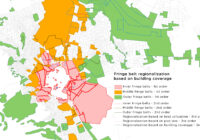Throughout history, cities have been the core of human settlements. Over time, these settlements have grown, become more complex, and dynamic, presenting an increasing challenge for planners and other agents responsible for the management of the urban landscape. However, the rapid development of technology, especially the use of artificial intelligence (AI) is reshaping the future of our cities. AI has the potential to transform how cities are managed and shaped. So, how can AI play a crucial role in urban planning?
Artificial intelligence corresponds to systems that can mimic human intelligence. These systems can learn, analyse data, solve problems, and even make decisions. Urban planning is the discipline that deals with the development, shaping, and management of the urban landscape. Cities or urban landscapes are complex built environments that involve transportation, energy, infrastructure, security, and many other aspects of the urban environment. AI is a substantial tool for managing complexity.
AI has crucial potential in the management of optimizing urban services and infrastructure. It can also be employed to organize traffic flow and minimize congestion. It has great potential in optimizing energy in the built environment. Waste management is another aspect that AI can deal with. Sustainability of cities can be addressed through AI solutions. Planners can put forward essential solutions to minimize the footprint of the built environment.
AI has the potential and capacity to be part of planning, design, and architecture, reshaping the built environment, and making cities more sustainable, liveable and efficient places. The evolution of AI will perhaps create a more effective solution for the future of our cities, and it can help planners, policymakers, citizens and other agents responsible for the urban landscape to act for more sustainable solutions. Ultimately, we should use AI-based systems to make our cities more inclusive, resilient and sustainable. The future of cities will be shaped by technology, AI, and human creativity. These systems should be used inclusively, ethically, and transparently.


